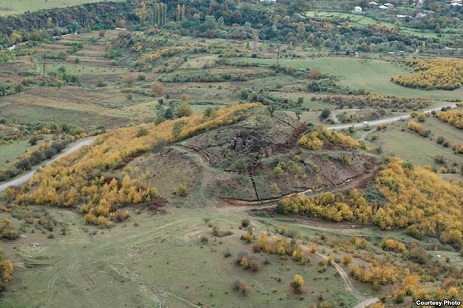A golden horizon for RMG Gold

RMG Gold will resume work at Sakdrisi gold mine in southern Georgia, which some archaeologists believe is the world’s oldest gold mine.
In a public statement, Georgia’s acting Minister of Culture Alexander Margishvili said a positive decision on restoring work at the site had already been sent to the investor company.
This news wasn’t received well by some. Earlier, a group of archeologists and non-governmental organisations (NGOs) opposed the company’s intention to launch an open-cast mine at the site. They believe this would make it impossible to continue further archeological research at the Sakdrisi-Kachaghiani prehistoric gold mine area.
The mine dated back almost 5,000 years. German and Georgian archaeologists have been excavating the site since 2006.
That same year Sakdrisi was granted Cultural Heritage special status and became protected under the heritage laws.
However in 2013, the Ministry of Culture revoked this status, citing that the site was enlisted through procedural violations. The Ministry decided the site should retain an archeological site status but after three months this status was also removed.
Now the site has been removed from the list of protected areas, RMG is able to proceed with mining operations at the site.
"It is so unfair to ignore the results of nine years of research by international scientists and high public interest surrounding Sakdrisi-Kachaghiani,”representatives of NGO’s said today, responding to yesterday’s surprise announcement by Georgia’s Prime Minister Irakli Garibahsvili.
At a meeting with students at Tbilisi State University yesterday, Garibahsvili argued the site did not represent archeological value and focused mainly on the importance of the investor’s operations on the country’s economy.
"It is not substantiated that it was the [oldest] gold mine… This is not the oldest gold mine, it was not proven,” Garibashvili said.
"This company [RMG] has invested $300 million dollars in the Georgian economy. Three thousand people are employed by this company [and] 3,000 families are behind these employees.”
He said the "fate” of these 3,000 people also had to be "taken into consideration” when deciding on the issue.
The PM announced the company had proposed to build a museum in the surrounding area to house artifacts it discovered as a result of archeological research on the site. In saying that, the proposal did not allow for further archeological research on the site.
Garibashvili said cultural heritage was a "delicate issue” and there was a battle between the cultural heritage and economic interests all over the world, with Georgia being no exception.
"It requires finding a golden mean,” he said.
Sakdrisi Gold Mine has also become a topic of controversy at the Ministry of Culture. Last month, Marine Mizandari was dismissed from her role as the country’s first Deputy Minister of Culture by the decree of the PM.
The official reason of her dismissal was disobedience and personal incompatibility with the Minister but Mizandari believed she was let go following disagreements with the Culture Minister on several issues including the Sakdrisi Gold Mine.
Meanwhile in late January last year, RMG Gold mining company laid off more than 180 workers, which sparked a large percentage of workers to strike from the plant in the small town of Kazreti on February 14. The company said it was forced to lay off workers because of "significantly downscaled mining activities” as it was not able to dig gold from Sakdrisi.
Striking workers demanded a pay increase, improvement of working conditions and reinstatement of sacked employees, among other things.
Complaining over lack of attention by the Government, a group of strikers arrived in Tbilisi on March 7 and held a rally outside the Government’s office, after which the PM’s office said its representatives would try to mediate between the strikers and the employer.
The NGOs who opposed RMG restoring work at the gold mine site believed the Government echoed the investor company’s position toward the issue.
They demanded the Culture Ministry keep its promise and invite international experts to objectively assess the archeological site.
 Tweet
Tweet  Share
Share